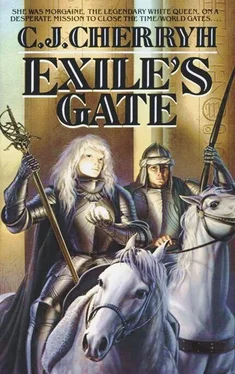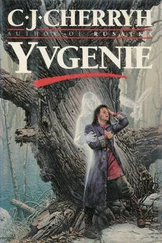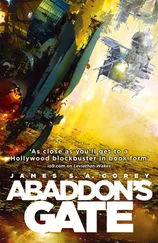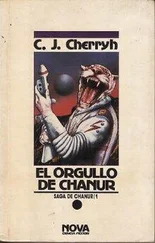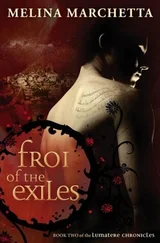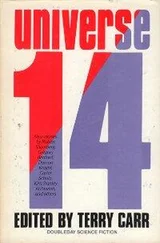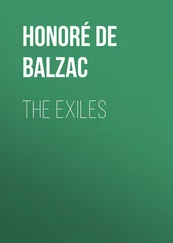C. Cherryh - Exiles Gate
Здесь есть возможность читать онлайн «C. Cherryh - Exiles Gate» весь текст электронной книги совершенно бесплатно (целиком полную версию без сокращений). В некоторых случаях можно слушать аудио, скачать через торрент в формате fb2 и присутствует краткое содержание. Жанр: Фэнтези, на английском языке. Описание произведения, (предисловие) а так же отзывы посетителей доступны на портале библиотеки ЛибКат.
- Название:Exiles Gate
- Автор:
- Жанр:
- Год:неизвестен
- ISBN:нет данных
- Рейтинг книги:3 / 5. Голосов: 1
-
Избранное:Добавить в избранное
- Отзывы:
-
Ваша оценка:
- 60
- 1
- 2
- 3
- 4
- 5
Exiles Gate: краткое содержание, описание и аннотация
Предлагаем к чтению аннотацию, описание, краткое содержание или предисловие (зависит от того, что написал сам автор книги «Exiles Gate»). Если вы не нашли необходимую информацию о книге — напишите в комментариях, мы постараемся отыскать её.
Exiles Gate — читать онлайн бесплатно полную книгу (весь текст) целиком
Ниже представлен текст книги, разбитый по страницам. Система сохранения места последней прочитанной страницы, позволяет с удобством читать онлайн бесплатно книгу «Exiles Gate», без необходимости каждый раз заново искать на чём Вы остановились. Поставьте закладку, и сможете в любой момент перейти на страницу, на которой закончили чтение.
Интервал:
Закладка:
C.J. Cherryh
Exile's Gate

Prologue
The qhal found the first Gate on a dead world of their own sun.
Who made it, or what befell those makers, the qhal of that age never learned. Their interest was in the dazzling prospect it offered them, a means to limitless power and freedom, a means to shortcut space and leap from world to world and star to star — instantaneous travel, once qhalur ships had crossed space at realtime, to carry to each new site the technology of the Gates and establish the link. Gates were built on every qhalur world, a web of eyeblink transport, binding together a vast empire in space.
That was their undoing . . . for Gates led not alone where but when, both forward and backward along the course of worlds and suns.
The qhal gained power beyond their wildest imaginings; they were freed of time. They seeded worlds with gatherings from the far reaches of Gate-spanned space . . . beasts, and plants, even qhal-like species. They created beauty, and whimsy, and leaped ahead in time to see the flowerings of civilizations they had planned — while their subjects lived real years and died in normal span, barred from the freedom of the Gates.
Real-time for qhal became too tedious. The familiar present, the mundane and ordinary, assumed the shape of a confinement no qhal had to bear . . . the future promised infinite escape. Yet once a qhal made that first forward journey, there could be no return. It was too dangerous, too fraught with dire possibilities, to open up backtime. There was the deadly risk of changing what Was. Only the future was accessible; and qhal went.
Some went further than certainty, pursuing the hope of Gates which might or might not exist where they were predicted to be built. More lost their courage completely and ceased to believe in further futures, lingering until horror overwhelmed them, in a present crowded with living ancestors in greater and greater numbers. Reality began to ripple with unstable possibilities.
Perhaps some desperate soul fled to backtime, seeking origins or a lost life or a memory; or perhaps at last the very weight of extended time and energies grew too much. Might-have-been and Was were confounded. Qhal went mad, perceiving things no longer true, remembering what had never been true in the worlds which now existed.
Time was ripping loose about them — from ripplings to vast disturbances, the overstrained fabric of space and time undone, convulsed, imploded, hurling all their reality asunder.
Then all the qhalur worlds lay ruined. There remained only fragments of their past glory . . . stones strangely immune to time in some places, and in others suddenly and unnaturally victim to it . . . lands where civilization rebuilt itself, and others where all life failed, and only ruins remained.
The Gates themselves, which were outside all time and space . . . they endured.
A few qhal survived, remembering a past which had been/might have been true.
Last came humans, exploring that dark desert of worlds the qhal had touched . . . and found the Gates.
Men had been there before . . . having been victims of the qhal and therefore involved in the ruin; Men looked into the Gates, and feared what they saw, the power and the desolation. A hundred went out those Gates, both male and female, a mission with no return. There could only be forward for them; they must seal the Gates from the far side of time, one and the next and the next, destroying them, unweaving the deadly web the qhal had woven . . . to the very Ultimate Gate or the end of time.
World after world they sealed . . . but their numbers declined, and their lives grew strange, stretched over millennia of real-time. Few of them survived of the second and third generations, and some of those went mad.
Then they began to despair, for all their struggle seemed hopeless: one Gate omitted anywhere across the web would begin it all again; one Gate, anywhen misused, could bring down on them the ruin of all they had ever done and make meaningless all their sacrifice.
In their fear they created a weapon, indestructible save by the Gates which powered it: a thing for their own protection, and containing all the knowledge they had ever gained of the Gates — a doomsday force against that paradoxical Ultimate Gate, beyond which was no passage at all —o r a truth worse than all their nightmares.
They were five when that dreadful Weapon was made.
There was one who survived to carry it.
Chapter One
Vision of horses, one gray and shadow, one star-white, bothshod for war . . . one dark rider, one pale, across void andnight—
In gray lines, horses and riders appear along the river-ridge, concealed in mist and the uncertainties of dawn. Weapons bristle up, lower, all in one nightmare movement of the charge. It is ambush, and below them, humans ride along the sedge-rimmed river, Ichandren's men, their weapons laid across saddlebows. Ichandren looks up aghast at the first thin shout, the thunder that comes down on them in morning mist, the hedge of weapons that materializes out of the fog. The promised truce is broken, the valley has become a trap into which shadowy riders pour off either slope.
"Back!" Ichandren yells, wheeling his horse about.
The hindmost of his men shriek and die, pierced by lances, and the riderless horses splash along the reed-edged banks. The mist is full of shadows, shadows of enemies, of human riders fleeing in confusion, small bands battling in isolation. Even sound is distorted, echo mingling with present orders, screams and the clash of weapons ringing off the hills.
Some attempt retreat; but other shadows come pouring out of the mist behind, and horns sound in wild confusion. Ichandren shouts orders, but there is no relief, the enemy is too numerous, and his voice is lost in the confusion.
In despair he rallies such of his guard as he can, and turns and drives back the way he has come, in a world of shades and ghosts.
Vision of horses, the gray and the white, hooves descending, slowly, all of time and existence suspended upon that single motion—
In the opal dawn, in the mist, arrows fall like black sleet on flesh and steel, and thunder on wooden shields, finding chinks in the failing defense. Hammer and hammer again, blow after blow. Horses are down, threshing and screaming, crushing the wounded and the dead. Men flee afoot, cut down by the sweep of riders on the perimeters.
There is no more hope. Ichandren has met ambush. The fox has been out-foxed, and the enemy riders circle, cutting down those few who evade that last sweep.
But most rally around Ichandren, as horses go down, as men fall.
No arrows now. At the last it is swords and a battle afoot, humans against humans, Ichandren's men against those who have sold their souls to Morund.
"Bron!" Chei ep Kantory cries, seeing his brother fall, his place suddenly vacant in the defensive circle and Morund crests surging against it. He tries to gain those few feet, in that desperate knot about Ichandren, to die shielding his brother, for it is only a question of place now: weight of numbers bows their slight defense and breaks their shield-ring.
But thunder breaks behind him. Chei turns and lifts his sword, but there are two of them, helmed and masked, who come thundering toward him across the brook, throwing a fine spray in the first breaking of the sunlight.
Читать дальшеИнтервал:
Закладка:
Похожие книги на «Exiles Gate»
Представляем Вашему вниманию похожие книги на «Exiles Gate» списком для выбора. Мы отобрали схожую по названию и смыслу литературу в надежде предоставить читателям больше вариантов отыскать новые, интересные, ещё непрочитанные произведения.
Обсуждение, отзывы о книге «Exiles Gate» и просто собственные мнения читателей. Оставьте ваши комментарии, напишите, что Вы думаете о произведении, его смысле или главных героях. Укажите что конкретно понравилось, а что нет, и почему Вы так считаете.
